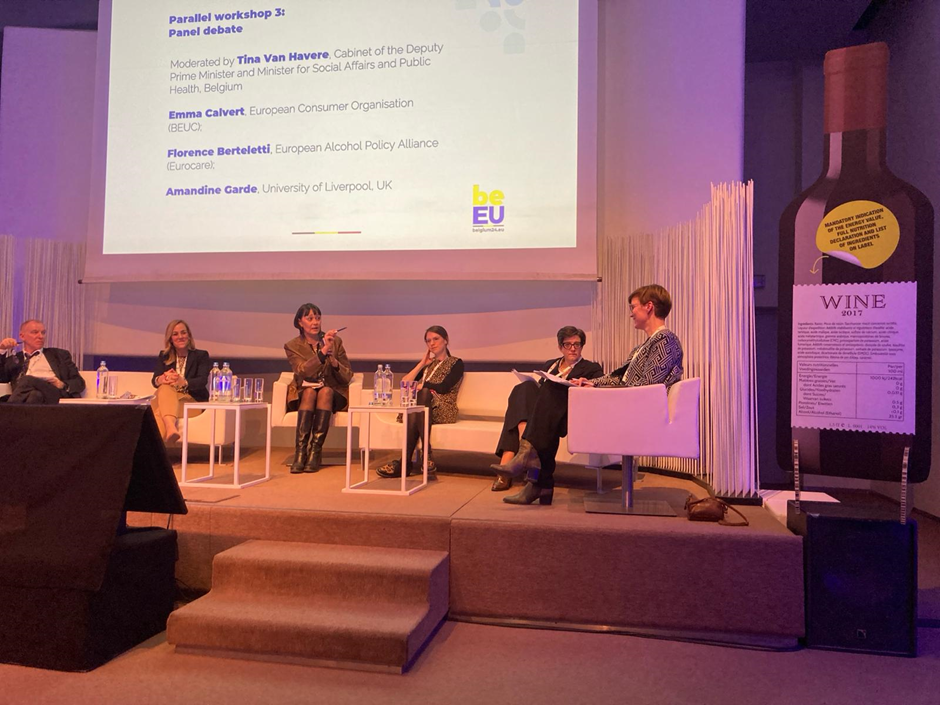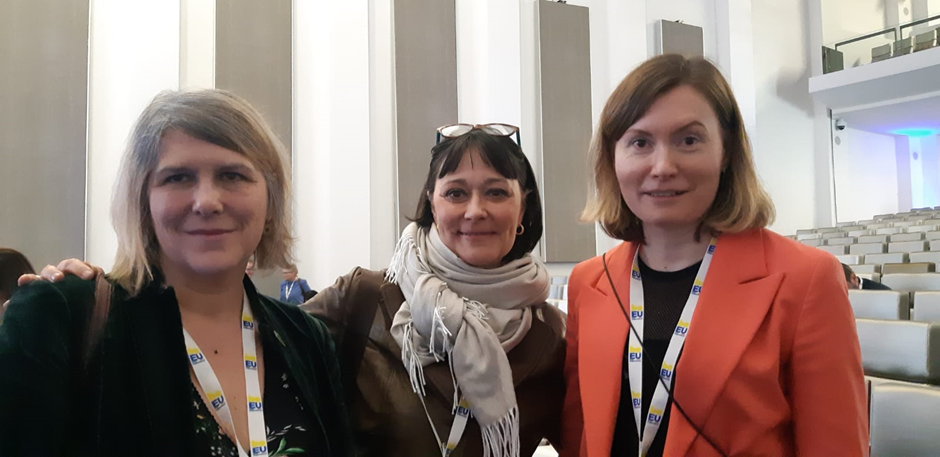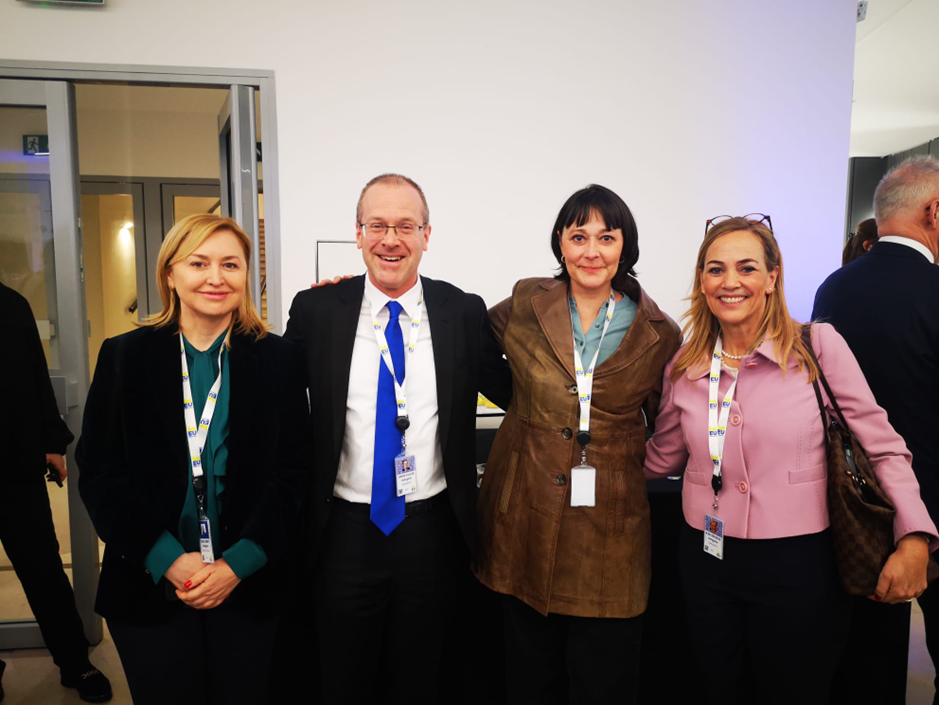Shaping the Future of EU Health Policy: What Role for Non-communicable Disease Prevention?
Eurocare’s Secretary General Florence Berteletti (center) with Lilia Olefir (left), Director of Smoke Free Partnership, and Frank Vandenbroucke (right), Minister of Health and Social Affairs of Belgium.
As part of the Belgian Presidency of the Council of the European Union, a High-level Conference on the Future EU Health Union was organised on the 26th and 27th of March by Belgium’s Federal Public Service Public Health, Food Chain Safety and Environment. Key themes for discussion included health workforce shortages, medicine supply vulnerabilities, non-communicable disease (NCD) prevention, crisis preparedness, and access to EU funding for health investments.
This gathering drew significant attention and engagement, with over 300 participants joining, including the European Commissioner for health, ministers, state secretaries, delegations from member states and EU institutions, civil society and academics. Eurocare was represented by its Secretary General, Florence Berteletti, and Advocacy and Project Coordinator, Anamaria Suciu. Florence Berteletti was a panellist in the debate on EU’s role on NCD prevention as part of the Healthy Populations workshop.

From left to right: Philippe Roux, (Acting) Director Public Health, Cancer and Health Security at DG SANTE, European Commission; Carina Ferreira-Borges, Regional Advisor, Unit Head Alcohol, Illicit Drugs and Prison Health, Special Initiative on NCDs and Innovation, WHO Regional Office for Europe, Florence Berteletti, Eurocare’s Secretary General, Emma Calvert, Senior Food Policy Officer at BEUC, The European Consumer Organisation, Amandine Garde, Professor of Law at the University of Liverpool, UK, Tina Van Havere, Advisor at the Cabinet of the Deputy Prime Minister and Minister for Social Affairs and Public Health
One major take-away from the conference was the growing recognition of alcohol consumption as a major public health concern in Europe. Calls for population-wide prevention measures, encompassing regulations on product marketing, pricing, availability, and promotion, resonated throughout the discussions.
However, there is also growing recognition of the influence of commercial interests on decision-making processes, notably within initiatives like Europe’s Beating Cancer Plan. While ambitious legislative proposals for the prevention of NCD risk factors such as tobacco, alcohol and unhealthy food and drinks were announced under this plan, progress has been stalled, prompting a unified plea for sustained momentum in advancing the plan's prevention pillar. Additionally, the disproportionate attention granted by the European Commission to the alcohol industry compared to civil society in discussions on alcohol labelling has come to light[1], compounding recent findings of maladministration due to a lack of transparency in the Commission’s interactions with tobacco lobbyists[2].
On the bright side, the conference highlighted once again the commitment of determined allies in the fight against commercial determinants of health, including figures like Frank Vandebroucke, Minister for Social Affairs and Public Health in Belgium and Riina Sikkut, Minister of Health, Republic of Estonia as well as entities like the World Health Organization. There was a growing consensus that tackling health issues at the EU level not only yields greater results but also fosters a more cohesive approach among member states.
Minister Vandenbroucke emphasized that a key priority for the EU should be prevention, with a focus on regulating the supply within the market. He stated, “Prevention is very much about consumption. Consumption is about what is on the market. When you say market, you say EU. And so the role of the EU in creating an environment, a market first of all, that promotes a healthy lifestyle is key, and I think it is underrated.” He went on to express his anticipation for more initiatives in regulating harmful products like tobacco and alcohol, which are internal market products and hence within the competences of the EU.
Joint action on tobacco policy was also called for by Riina Sikkut, Minister of Health, Republic of Estonia: “When we collectively aim for a tobacco-free generation it is ambitious, we stand out and it’s something we can only do together.” Minister Sikkut highlighted the challenge of advocating for such policies on a national level when each country maintains distinct policies and various competing interests. Therefore, she stressed the importance of setting ambitious goals collectively at the EU level to counter the influence of powerful international corporations producing harmful products like tobacco.

Eurocare’s Secretary General Florence Berteletti (center) with Charlotte Marchandise (left), Executive Director of the European Public Health Association, and Riina Sikkut (right), Minister of Health, Republic of Estonia
Eurocare welcomes the organisation of such a timely and high-quality gathering and commits to continuing alongside its partners to call for a future EU health union which prioritizes citizens’ right to live in an environment enabling them to make the healthy choices, regardless of where they live. And for an EU in which civil society has a significant role to play in defending peoples’ rights against the commercial vested interests.

From left to right: Oxana Domenti, WHO Representative to the EU; Hans Kluge, WHO Regional Director for Europe; Florence Berteletti; & Carina Ferreira-Borges, Programme Manager for Alcohol, Illicit Drugs and Prison Health in WHO European Office.
[1] https://www.beuc.eu/blog/lobbying-hangover-how-intense-alcohol-industry-pressure-put-commission-labelling-plans-on-the-rocks/
[2] https://www.ombudsman.europa.eu/en/news-document/en/168641

